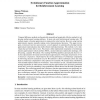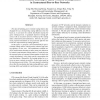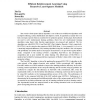77 search results - page 11 / 16 » Value Function Approximation in Reinforcement Learning Using... |
CORR
2010
Springer
13 years 7 months ago
2010
Springer
Temporal difference methods are theoretically grounded and empirically effective methods for addressing reinforcement learning problems. In most real-world reinforcement learning ...
P2P
2006
IEEE
14 years 1 months ago
2006
IEEE
The idea of building query-oriented routing indices has changed the way of improving routing efficiency from the basis as it can learn the content distribution during the query r...
JAIR
2002
13 years 7 months ago
2002
The recursive least-squares (RLS) algorithm is one of the most well-known algorithms used in adaptive filtering, system identification and adaptive control. Its popularity is main...
ESANN
2003
13 years 9 months ago
2003
The resource constraint project scheduling problem (RCPSP) is an NP-hard benchmark problem in scheduling which takes into account the limitation of resources’ availabilities in ...
AI
1998
Springer
13 years 7 months ago
1998
Springer
Reinforcement Learning (RL) is the study of programs that improve their performance by receiving rewards and punishments from the environment. Most RL methods optimize the discoun...



